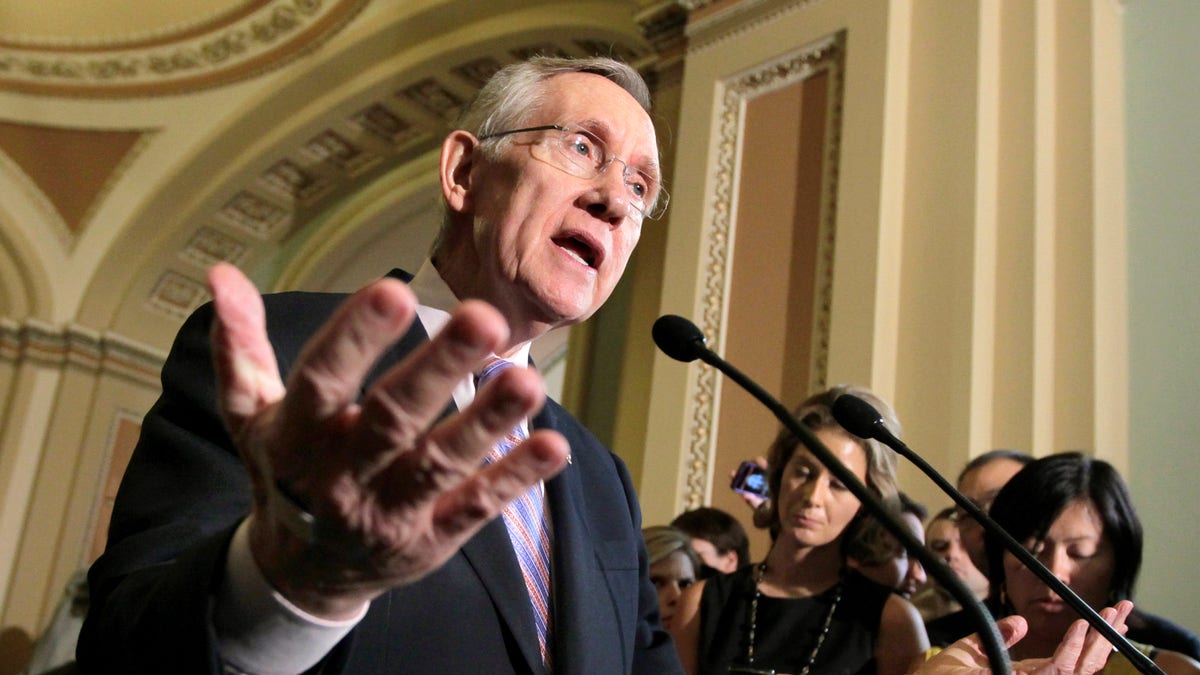
Senate Majority Leader Harry Reid of Nev. speaks with reporters about the conflicting plans to deal with the debt crisis, Tuesday, July 26, 2011, on the Hill Capitol in Washington. (AP)
Congress may be running out of options for heading off a U.S. credit downgrade, and, in a cruel twist, it is effectively at the mercy of the very rating agencies faulted for helping drive the financial crisis.
Absent a sweeping deficit-reduction plan, at least one rating agency says the United States could still be at risk of losing its sterling AAA status even if Congress lifts the debt ceiling by next week. While the same rating firms were widely implicated in the mortgage meltdown that triggered the financial crisis that exacerbated the country's deficits -- leading to a congressional crackdown last year -- analysts say Congress has little leverage with the agencies this time around.
"Ultimately, the ratings agencies are just intermediaries between the problem, which is the debt outlook, and the markets, who are going to have to evaluate that problem," said Douglas Holtz-Eakin, former director of the Congressional Budget Office. "And I don't think that given the scale of the problem there's anything they can do to the ratings agencies to fool (the markets) on this."
Holtz-Eakin said don't expect Congress to play hardball with those firms again just to avert a downgrade.
"If the Congress were so ham-handed as to threaten the ratings agencies, markets would react accordingly, and it wouldn't work, so they're not going to go there," he said.
Jim Manley, a former spokesman to both Senate Democratic Leader Harry Reid and the late Sen. Ted Kennedy, also said he didn't think Congress would try to retaliate with new regulations or oversight hearings on the credit ratings firms if they did downgrade the U.S. rating, noting the Europeans tried a similar tack before Greece got junk bond status.
"That would smack of a banana republic," Manley told FoxNews.com.
Congress moved to rein in the rating agencies' influence following their role in the mortgage mess. They were accused of fueling the subprime boom by giving safe ratings to the securities that were based on those risky loans. The Financial Crisis Inquiry Commission, on which Holtz-Eakin served, concluded earlier this year that the top three rating agencies were "key enablers of the financial meltdown," since the securities at the heart of the crisis couldn't have been sold "without their seal of approval."
In the wake of the widespread financial collapse, Congress passed a financial overhaul bill last year that sought to minimize their influence in how federal agencies regulate the industry, and require the rating firms to adhere to new standards for disclosure and training.
But Holtz-Eakin said congressional retaliation in this case would not be a good idea. At this stage, the rating agencies are effectively telling Congress there's one way out of this -- raise the debt ceiling and deal with the deficit in a serious way.
Standard & Poor's has issued the starkest threat. The agency warned that the U.S. could suffer a credit downgrade even if Congress raises the debt ceiling, if that increase is not also paired with significant deficit reduction.
S&P is looking for a plan that cuts $4 trillion over the next decade.
After Reid claimed Tuesday morning that the rating agencies had endorsed his plan - which cuts $2.7 trillion at most -- S&P reiterated through a spokesman that it has not endorsed "any particular plan."
Rep. Tom McClintock, R-Calif., warned Tuesday that the U.S. could lose its AAA rating with any plan worth less than $4 trillion.
"They make pretty clear that just raising the debt limit cavalierly, reflexively, without any permanent structural spending reform mechanisms put in place could well be just as bad -- arguably much worse -- than not raising it at all," Tea Party-aligned Sen. Mike Lee, R-Utah, told Fox News.




